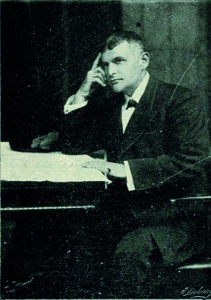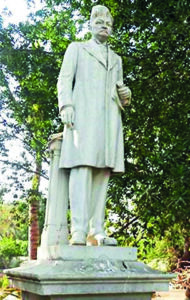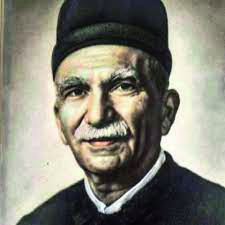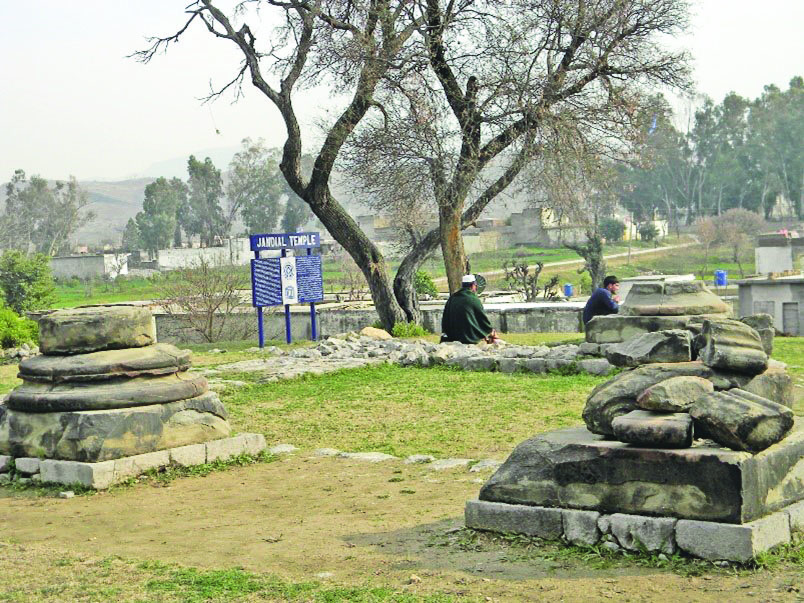Adil J. Govadia
 According to archaeological excavations, the Persian Empire that extended from Central Asia to the present-day Afghanistan / Pakistan region, may have developed significantly in the 6th century BC, during Persia’s Achaemenid Dynasty. A prehistoric Parthian Zoroastrian fire-temple called Jandial, in Taxila (Takshashila) is reminiscent of the Persian Zoroastrian footprint dating back to 1st century BC (Reported in Dawn dated July 12, 2015). Emperor Darius the Great, before conquering the Indus Valley, is believed to have spent quality time in the Gandhara region, surrounding Taxila, where the Achaemenid rule continued for over a century thereafter.
According to archaeological excavations, the Persian Empire that extended from Central Asia to the present-day Afghanistan / Pakistan region, may have developed significantly in the 6th century BC, during Persia’s Achaemenid Dynasty. A prehistoric Parthian Zoroastrian fire-temple called Jandial, in Taxila (Takshashila) is reminiscent of the Persian Zoroastrian footprint dating back to 1st century BC (Reported in Dawn dated July 12, 2015). Emperor Darius the Great, before conquering the Indus Valley, is believed to have spent quality time in the Gandhara region, surrounding Taxila, where the Achaemenid rule continued for over a century thereafter.
Later, in the early 19th century, Khan Bahadur Dhanjibhoy Fakirji Commodore from Surat, was the first to visit the Gandhara region, where he started a Tonga service (horse carriage) between Rawalpindi and Srinagar. He also launched a ‘Tonga Ambulance’ service during WW I that helped the British forces. Immensely popular and successful, Khan Bahadur Dhanjibhoy Commodore was bestowed the title, ‘Champion of the Most Eminent Order of the Indian Empire’, besides being a proud recipient of ‘Kaisar-e-Hind’ Gold Medal.
 In 1848, the first Dokhma was consecrated in Karachi. In next six decades, by which time the community numbers had grown substantially in Karachi, Parsis built a second Dokhma (1875); two Agiaries (1849, 1869); two schools (1859, 1880); four housing projects for the poor and widows (1854, 1889, 1903, 1911); a maternity hospital (1909); two charitable dispensaries (1882, 1887); a Dharamsala (1888); a social and sports center (1894); and a Young Men’s Zoroastrian Association (1910).
In 1848, the first Dokhma was consecrated in Karachi. In next six decades, by which time the community numbers had grown substantially in Karachi, Parsis built a second Dokhma (1875); two Agiaries (1849, 1869); two schools (1859, 1880); four housing projects for the poor and widows (1854, 1889, 1903, 1911); a maternity hospital (1909); two charitable dispensaries (1882, 1887); a Dharamsala (1888); a social and sports center (1894); and a Young Men’s Zoroastrian Association (1910).
In 1861, Seth Ardashir C. Wadia was appointed Chief Resident Engineer of the Indus Flotilla Company in Karachi, which eventually constructed a major shipping port in Karachi. Likewise, in 1884, Seth Hormusji Rustomji pioneered the tramway network and pioneered a low-cost housing colony besides contributing magnanimously towards the establishment of the renowned ‘Dayaram Jethmal Sind College’.
Seth Eduljee Dinshaw, whose rise from poverty to becoming a major landowner in Karachi, is a spirited endorsement of his ingenious and entrepreneurial energy (Ref. Peerzada Salman’s ‘Even Local Stones Need Love’, The Dawn, July 12th 2009). His residence ‘Dinshaw House’ later became the official residence of Iskander Ali Mirza, the first President of independent Pakistan, and today remains a protected heritage property that is home to the Karachi Press Club (KPC), since 1958.
Seth Eduljee Dinshaw’s charities were mostly devoted towards healthcare – noteworthy being Lady Dufferin Hospital (1884), ‘Eduljee Dinshaw Dispensary’ (1882) and ‘Nadirshaw Eduljee Dispensary’ (named after his son). He also contributed towards the construction of Mama Parsi School (1912) and Sindh Art College (1885). A life-sized marble statue of the magnanimous philanthropist still exists opposite the Palace theatre in Karachi, which was unveiled in 1933 (Ref Parsi Prakash Vol VII).
Khan Bahadur Sir Kavasji Hormusji Katrak, one of the first Trustees of the Karachi Parsi Anjuman, started his career as a young Parsi religious teacher at the Navsari madrassa. He initially served in Peshawar and Kabul before moving to Karachi to open a shop. Later, Sir Kavasji built a maternity ward at the Lady Dufferin Hospital, donated land for the Katrak Parsi Colony, built the Young Men’s Zoroastrian Association and constructed the ‘Hormusji Katrak Hall’ (in memory of his father), besides erecting the Sorab Katrak library! Acknowledged as ‘a friend of the poor’, his marble bust was unveiled in 1929, at the Parsi Colony in Karachi, by Sir William Birdwood, Commander-in-Chief of India.
 Sir Jehangir Kothari was known for noble charities and hospitals. His magnanimity is eternally remembered in Bangalore where he built a Tudor-style ‘Kothari Hall’ – a club for Parsi community, in memory of his wife, Lady Goolbai who was laid to rest at Bangalore’s Aaramgah.
Sir Jehangir Kothari was known for noble charities and hospitals. His magnanimity is eternally remembered in Bangalore where he built a Tudor-style ‘Kothari Hall’ – a club for Parsi community, in memory of his wife, Lady Goolbai who was laid to rest at Bangalore’s Aaramgah.
Parsis, who opted to stay back in Pakistan post-partition in 1947, contributed immensely to its progress. In shipping, three prominent Parsi families -the Cowasjis, Dinshaws and Dubashes distinguished themselves in their respective business enterprises. In hotels and hospitality business, the Avari and Minwalla families are renowned while Seth Dorab Patel and Seth Sorab Sidhwa are the most respected and illustrious legal eagles of Pakistan. Admiral Villy Engineer was the first lady Admiral of Pakistan Navy while Seth Jamshed Nusserwanji Mehta was the first elected Mayor of Karachi and remembered as the ‘Maker of Modern Karachi’. He served as the President of the City Corporation for twelve years.
Justice Dorab Framroze Patel, former Chief Justice of Sindh High Court, also served as a Judge in the Supreme Court. Justice Dorab F. Patel, a prominent campaigner for human rights, was the founding member of the Asian Human Rights Commission (AHRC) in 1987, and co-founder of the Human Rights Commission of Pakistan (Ref. Wikipedia). Similarly, Seth Rustam Sohrabji Sidhwa, a keen philatelist, was a former judge on the Supreme Court of Pakistan and one of the original eleven judges of the International Criminal Tribunal for the former Yugoslavia.
Seth Dinshaw B. Avari was immensely popular having served as the founder President of Hotels Association of Pakistan and several other educational institutions, as also member of the Sindh-Red Cross, whole-heartedly supporting the Society of Prevention of Cruelty to Animals. His son, Seth Byramji D. Avari, a prominent businessman and a renowned sportsman, represented Pakistan at two Asian Games, besides winning two gold medals in yachting at the Asian Games (Bangkok, 1978 and Delhi 1982), and a silver medal at the Enterprise World Championship (Canada, 1978).
- ઝેડએસી કોંગ્રેસમેન લૂ કોરિયાનું આયોજન કરી સાયરસ ધ ગ્રેટને શ્રદ્ધાંજલિ આપી - 15 February2025
- ડીએઆઈની એમ એફ કામા અથોરનાન ઈન્સ્ટીટયુટની સફર - 15 February2025
- WZCC Toronto Conclave 2025: The Other Side of Business - 15 February2025
